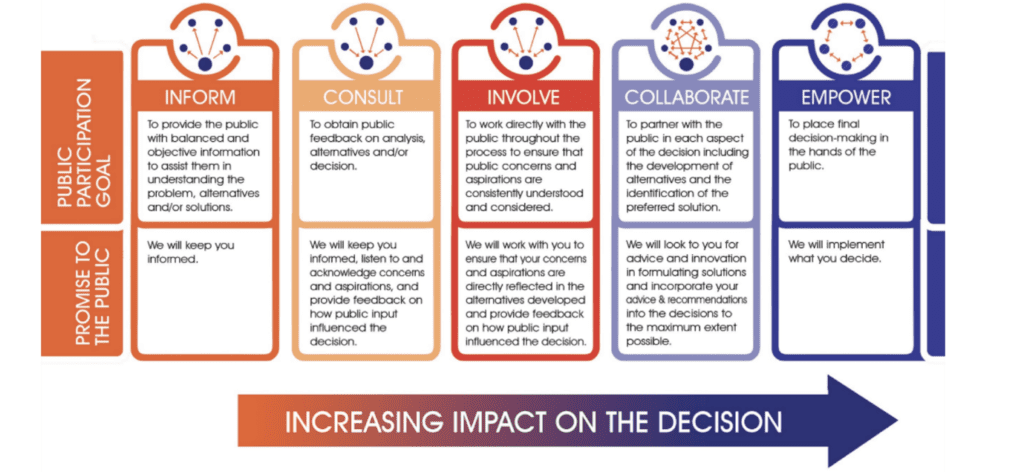Community engagement has emerged as an essential avenue for assessing the needs of all community members and ensuring that positive change results from policy, service delivery and infrastructure developments. But for the 1 in 5 Australians who identify as a person with disability (17.7% of the population), systemic exclusion from community and stakeholder engagement continues to prevent their needs from being heard.
The 2019 Royal Commission into Violence, Abuse, Neglect and Exploitation of People with Disability, brought the inclusion of people with a disability in participatory justice to the forefront of our national consciousness, as the Australian government sought consultation with a record-breaking number of stakeholders with a disability to inform their work. The Commission continues to implement targeted strategies to proactively employ people with disabilities across the board to assist in achieving its best possible outcomes. Unfortunately, however, the inclusion of people with disabilities in everyday community engagement is often overlooked as a product of the inherent discrimination in our society.
Understanding the legacy of ableism
The longstanding history of segregation has been enforced upon people with a disability, in the form of special schools, residential institutionalisation, psychiatric facilities and aged care facilities. This has fostered a contemporary environment in which community institutions and service providers are often ill-equipped to provide inclusive care to disabled individuals. This legacy has detrimental effects on people with disabilities, preventing their full participation and inclusion in public life, and often times restricting their access to employment, housing, transport and communication systems.
In Australia, the effect of this exclusion is rife – with workforce participation for individuals with a disability coming in at 54%, compared to 83% for people without a disability, and 1.2 million people with disabilities reporting difficulties using public transport.
1 in 3 Australians with a disability report that their customer needs are not often met when attempting to use public services, and as a result, 34.3% testify that they specifically avoid everyday situations due to concerns around accessibility (with the most common examples being visiting shops and banks).
According to the United Nations, the impact of ableism is global, with individuals with a disability worldwide found to experience poorer health outcomes, lower education achievements, higher rates of poverty and decreased economic participation.
The community consultation experience
Moving beyond the tendency to overlook individuals with disabilities when assembling community consultation panels and workshops, people with disabilities often face barriers to participation even when they are invited to contribute. This can look like:
- Wheelchair users being asked to attend co-design workshops, where buildings are inaccessible – without ramps or elevators.
- Individuals with hearing difficulties being invited to share their opinions on presentations that are not delivered with Auslan (ASL) interpretation.
- People with neurological or intellectual disabilities being asked to attend community events, featuring insensitive video or music choices that induce sensory overload.
In a society in which all citizens and communities are supported to actively engage in the policy making process and in shaping the delivery of programs and services, the inability to cater for people with disabilities is unacceptable.
So how do I design community engagement around accessibility needs?
According to best practice standards for engaging and consulting with people with a disability, there are several important principles that define inclusion in this domain. These include:
- Catering to a variety of individual needs
- Providing flexibility and adaptability
- Respecting a spectrum of different experience
- Building an environment of emotional safety.
At the centre of disability engagement, we recommend taking the time to consider why you are engaging with diverse communities, as per the guidelines below:

Reasons for Public Engagement (Source: IAP2)
Other important accessibility needs to consider in your facilitation of in-person and online events are:
Physical accessibility
- Ensuring that the venue can be accessed using a ramp or elevator, and has appropriate space for mobility aids
- Ensuring that the venue has accessible bathrooms
- Confirming that the venue is willing to adhere to provisions around service animals (providing water bowls, and toileting options etc.)
- Including carers and interpreters in catering and seating plans.
Wayfinding
- Checking that the venue is clearly visible, with well signed entrances, lifts and hallways
- Confirming that the venue is accessible to people who rely on public transport
- Ensuring that there is ample space for mobility aids in between lecterns/tables and clearing the rooms of trip hazards.
Communication
- Providing printed information in easy read and large print formats
- Providing ASL translations, closed captioning and braille materials alongside speeches and presentations.
Digital accessibility
- Ensuring that video conferencing/webinar software and reading materials comply with Web Content Accessibility Guidelines 2.1
- Checking that social media advertisements and digital invitations or instructions are available in an accessible Word, PDF or email format
- Providing directions that are clear and easy to interpret
The inclusion of individuals with disabilities in community consultations continues to produce positive outcomes, supporting disabled people to thrive.
In May 2019, the National Construction Code was amended to require the embedding of accessible Changing Places bathroom facilities in the majority of new and refurbished buildings. See here
Furthermore, as of 30th April 2021, minimum accessibility provisions for residential housing and apartments have been rolled out for new buildings. See here
To continue to support the ability for disabled people to affect positive change, get notified about upcoming DEI courses here.






